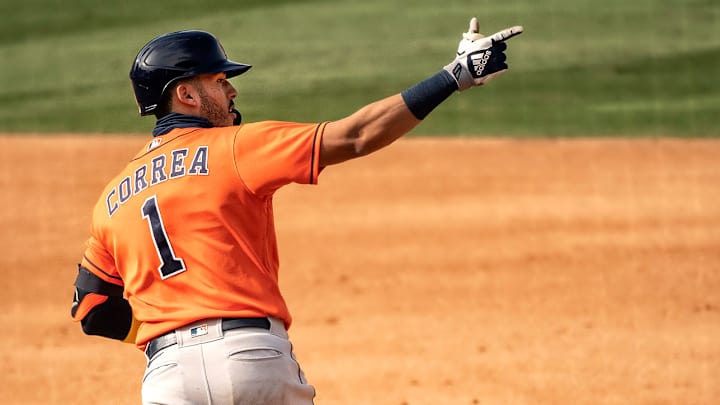Vindication or Nightmare: What Are We Supposed to Make of Astros' Postseason Success?

Editor's note: This piece originally published Wednesday, Oct. 7. It has been updated to reflect the Astros advancing to the ALCS.
This Astros team is almost, maybe, just the tiniest bit sympathetic. (I know. I know! But stay with me for a moment.)
Now on their way to the American League Championship Series, they’re one of the first teams ever to make the playoffs with a losing record, which makes them the ideal embodiment of the sort of chaos that this season was supposed to invite and hypothetically creates a potentially intriguing rooting possibility for neutral fans. Their injury-ravaged pitching staff has eight rookies in the bullpen. Beloved baseball lifer Dusty Baker is in his first year as their manager. That’s all a recipe for a team that is, if not loveable, at least not particularly hate-able.
But chances are you don’t feel that way. And justifiably so! They're still the Astros—you know, the team whose scandal roiled baseball for months this winter, igniting all sorts of discourse on the value of integrity, giving us regular use of phrases like “banging scheme” and “tattoo conspiracy theory.” There is still tension here. (It’s been less than two and a half months since Dodgers pitcher Joe Kelly made his feelings about the team known with a pout and a wild pitch, later saying, “They’re not respectable men to me.”) They’re still the villains—the most obvious such model in baseball in some time—and they know it. Which just makes it more striking how full of contradictions this version of the team is.
Houston is on its way to a fourth consecutive appearance in the ALCS (top dog), yet it is also a team that lost more than it won this season (underdog). They’re the team that won the 2017 World Series—José Altuve, Carlos Correa, George Springer, Alex Bregman—and yet they look completely different from that team. These are not the 2019 Astros, who came within a few outs of a championship, and led baseball in OPS+ and ERA+. These Astros ranked 17th and 14th, respectively, in those metrics. But these Astros are now playing somewhat like those Astros, they have won five of their six postseason games, and if you hate them for cheating their way to the top in 2017... it’s a bit messier now.
This dynamic was on display in Thursday's Game 4 victory over the A’s. The hero was Correa, with three hits (one home run) and five RBI. Altuve also homered. But a sizable chunk of the Astros' attack originated from less familiar sources. Michael Brantley–signed before last season–homered twice. Kyle Tucker–a rookie–knocked three hits. None of the game’s five pitchers played for the Astros in 2017.
This is how you get a quote like this one, from Lance McCullers, Jr. after Game 1: “We have a good team. We may not have the big names, big bank accounts, but we got guys with balls. We got a good team.” This, on its face, is patently untrue—Altuve! Correa! Bregman! But it’s not clear if he was referring to the team as a whole or the pitching staff, specifically, and when you look at this group sans Zack Greinke, McCullers certainly didn’t do himself any favors with the framework here, but in a vacuum, the statement isn’t wrong. This staff objectively is loaded with nobodies. (Again—eight rookies in the ‘pen.) That doesn’t erase the villain narrative. But it sure does muddle it.
Lance McCullers Jr: "We have a good team. We may not have the big names, big bank accounts, but we got guys with balls. We got a good team.”
— Chandler Rome (@Chandler_Rome) October 6, 2020
None of this is to suggest that it is irrational to dislike the Astros. For one thing, dislike in sports is often irrational by design, which is a feature. That’s partially because the dislike is so often institutional rather than individual: A Red Sox fan does not hate the Yankees as a roster of 25 men and attendant staff, but as a general concept, with individual hate perhaps spiking and dissipating as necessary. The dislike is built to accommodate the fact that the individuals are so frequently switched out. It’s built to survive as the roster turns over. It’s built to be inherited.
But the Astros dislike does not fit in this mold in the same way as, say, the dislike found in a typical rivalry. This dislike is specific, which makes it individual, which makes it far more rational. It is dislike that stems from particular actions—dislike as driven by a sense of justice, as a form of recourse, as a principle.
“The role of villain was given to us,” Baker told reporters before Game 1 of the ALDS. “It’s not something we took on, even though some of it was probably merited, or most of it was merited.”
The role is theirs indeed—even for those, like Baker, who weren’t around to build it. Now, just four wins from their third AL pennant in four years, it’s just a question of how far they can take it.

Emma Baccellieri is a staff writer who focuses on baseball and women's sports for Sports Illustrated. She previously wrote for Baseball Prospectus and Deadspin, and has appeared on BBC News, PBS NewsHour and MLB Network. Baccellieri has been honored with multiple awards from the Society of American Baseball Research, including the SABR Analytics Conference Research Award in historical analysis (2022), McFarland-SABR Baseball Research Award (2020) and SABR Analytics Conference Research Award in contemporary commentary (2018). A graduate from Duke University, she’s also a member of the Baseball Writers Association of America.
Follow emmabaccellieri